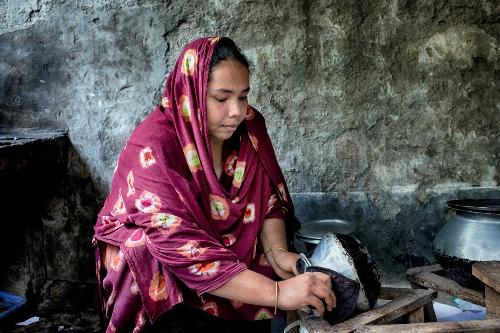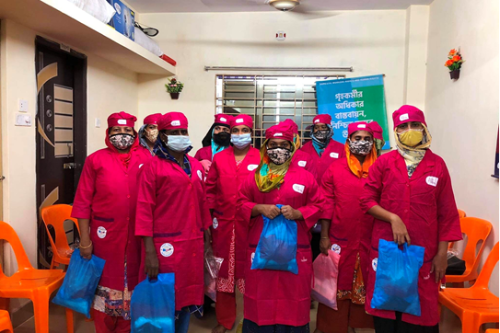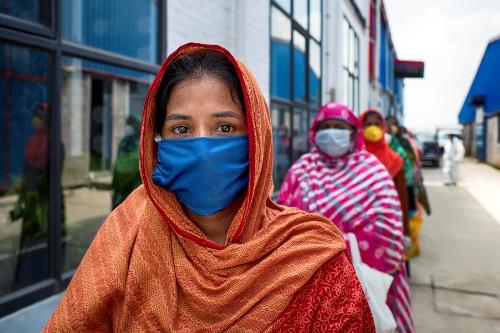Shining a light on the rights of domestic workers in Bangladesh

Having grown up in Dhaka, Bangladesh, Shamminaz Polen is very much aware of the importance of paid care workers there, for tasks from cooking and cleaning to caring for children and the elderly.

Photo Credit: Courtesy of Shamminaz Polen
“I don’t think I have known a household in Dhaka that operates without any domestic workers. It’s part of the culture,” says Polen. She also knows how little regard there is for the rights of these caregivers, largely women. They are often looked down upon, paid poorly, abused and ignored in legislation, with their employment considered “informal” in labour statistics and in terms of gaining access to social protections.
They are crucial to the economy and should be valued, says Polen, who today works as a program officer for Oxfam Canada on a project called Securing Rights of Women Domestic Workers in Bangladesh. The 5-year initiative, supported by Global Affairs Canada and implemented by partner groups on the ground, is opening eyes to the vital role of both paid and unpaid care workers in Bangladesh and beyond.
Polen, who came to live in Canada in 2017, notes that the disproportionate share of care work borne by women “is a world trend” that threatens women’s well-being. It leads to issues such as stigma and discrimination, health problems and gender-based violence.
Policymakers overlook paid domestic work because they feel “it doesn’t require specific skills, it doesn’t require having a standard minimum wage, and you don’t have to abide by any laws or policies,” she comments. However, caregiving “has always been a central, yet undervalued, contributor to the mainstream economy.”

Photo Credit: Fabeha Monir / Oxfam
Employing domestic workers allows women who might otherwise be “cooped up in a house taking care of the tedious day-to-day work” to participate in economic activities, Polen says. For instance, women with domestic help can have better-paid jobs in the ready-made garment sector, which is a major contributor to Bangladesh’s GDP, she points out.
In Bangladesh, there are an estimated 10.5 million paid domestic workers, one quarter of the entire population of Canada. According to the Bangladesh Institute of Labour Studies, they earn an average of just $15 a month.

Photo Credit: Nari Maitree
Shaheen Akter Dolly, executive director of Nari Maitree, a non-profit organization in Dhaka that supports disadvantaged and vulnerable women and youth, says many start doing care work as young children.
For example, Laily Begam has been a domestic worker since the age of 7. Employers often pay her half the salary she was promised, she says, and there is little respect for the work she does. Much of it disappeared entirely when the COVID-19 pandemic hit, Laily recalls. “I spent days without eating anything.”
Another domestic worker, Nasima, says she’s not paid for sick days. “When I ask for leave, they say, ‘Who will do this work then? Finish your work and then leave.’”

Photo Credit: Courtesy of Nari Maitree
Polen says the pandemic is especially highlighting the plight and critical role of domestic workers. At the height of the COVID-19 crisis, an estimated 95% of them lost their jobs, either because employers couldn’t afford to pay them or because they tend to live in slums where “hygiene is at a bare minimum,” while employers were concerned about risk of infection. She notes that domestic workers’ lives are now even more unstable, and they are “at the bottom of the pyramid” in terms of eligibility for vaccination programs.
At the height of the pandemic lockdowns, the Securing Rights project distributed monthly packets of food and hygiene supplies through groups like Nari Maitree to allow domestic workers and their families to get by. The project in a larger sense is “helping domestic workers to bring change in their lives,” says Dolly. Some 9,000 of them have been enrolled in skills training and life-skills education, where they learn to negotiate fair wages, working hours and conditions.
“The empowerment of women domestic workers is a pre-condition of building an equal society,” Dolly says. “We must work together to recognize their rights in the law, change the social norms and strengthen their agency.”

Photo Credit: Fabeha Mohir / Oxfam
For example, domestic worker Shahida Begam hopes the program will improve her lot and reduce the “condescending looks” coming from people. “You can’t look at work as small or big. Work is work,” says Shahida, whose “dream is to have my children become good humans. They will study and get good jobs.”
The Securing Rights project tells the stories of domestic workers such as Laily, Nasima and Shahida in social-media posts designed to change attitudes toward household employees. The awareness campaign has included an 8-part miniseries called “Tales of Home” that ran on national television in the summer of 2021. The primetime “edutainment” serial depicts the role of domestic workers in families and the need to pay and treat them humanely.
Dolly says the show has been seen by more than 5 million viewers and received many positive comments. The goal is to “spread the message very fast,” she explains. Securing Rights wants policymakers to recognize domestic work as a formal profession.
Polen hopes the program will bring “a sense of dignity” for caregivers. More importantly, the jobs they do are critical to recover from the pandemic, she adds. “Paid or unpaid, care work is essential to make sure everybody’s life goes on smoothly and in a better direction.”

Photo Credit: UCEP Bangladesh
Care workers in Bangladesh—By the numbers
Domestic workers are one of the most marginalized and disadvantaged groups in Bangladesh.
90% are women
47% have experienced physical abuse and face the threat of being expelled from work
63% report being forced to do work beyond their physical abilities
17% have experienced sexual harassment
40% perceive their workplace as insecure
68% report being frustrated with their current circumstances
Source: Bangladesh Institute of Labour Studies
- Date modified: